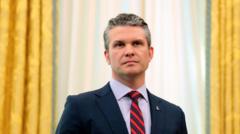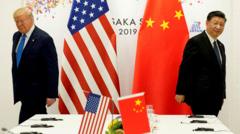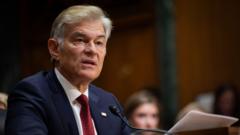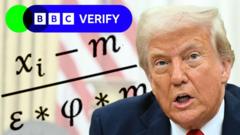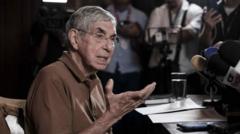The abrupt dismissal of the NSA chief amidst accusations of disloyalty highlights tensions within Trump's administration.
**Trump Administration Ousting of NSA Chief Sends Shockwaves Through National Security Community**
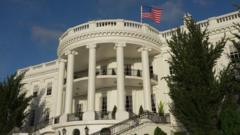
**Trump Administration Ousting of NSA Chief Sends Shockwaves Through National Security Community**
The firing of General Timothy Haugh raises concerns among Democrats about national security integrity.
Former White House officials and national security stakeholders expressed alarm following the dismissal of General Timothy Haugh, who served as head of the National Security Agency (NSA) and US Cyber Command. Reports indicate that this decision marks part of a broader shake-up within the Trump administration's security hierarchy. Some Democrats voiced concerns, asserting that the firings could compromise national security.
Reasons behind Haugh’s removal are currently unclear, but the timing is notable, coinciding with President Donald Trump’s meeting with far-right activist Laura Loomer. Following the meeting, Loomer alleged that Haugh and his deputy, Wendy Noble, were terminated due to their perceived disloyalty to Trump’s agenda. Trump, however, denied that Loomer influenced these personnel changes, emphasizing his prerogative to dismiss staff perceived as disloyal.
As rumors of the firings spread, reports indicated that additional officials from the National Security Council (NSC), including Brian Walsh and Thomas Boodry, were also let go, following the controversy surrounding the accidental inclusion of a journalist in a sensitive military communication thread. Though it remains uncertain whether these firings are interconnected, the incident has ignited scrutiny over the loyalty of security personnel within the current administration.
Democratic leaders on intelligence committees expressed deep concern, highlighting their respect for Haugh’s leadership qualities and warning that adherence to legal protocols and commitment to national security could be at odds with Trump’s expectations. Haugh's recent testimony to Congress regarding the Signal messaging leak raised further questions about the motivations behind his dismissal.
Critics have pointed to Loomer’s recommendation of firings as indicative of a troubling trend toward loyalty tests within U.S. security agencies. As Trump continues to assert his authority over staff dynamics, the ramifications of these dismissals for national security could reveal an unsettling new reality for the country.
Loomer defended her influence, underscoring the importance of stringent vetting within national security teams to ensure loyalty to the administration. As internal investigations continue, the implications for current and future state security personnel remain uncertain, with many urging caution moving forward.
Reasons behind Haugh’s removal are currently unclear, but the timing is notable, coinciding with President Donald Trump’s meeting with far-right activist Laura Loomer. Following the meeting, Loomer alleged that Haugh and his deputy, Wendy Noble, were terminated due to their perceived disloyalty to Trump’s agenda. Trump, however, denied that Loomer influenced these personnel changes, emphasizing his prerogative to dismiss staff perceived as disloyal.
As rumors of the firings spread, reports indicated that additional officials from the National Security Council (NSC), including Brian Walsh and Thomas Boodry, were also let go, following the controversy surrounding the accidental inclusion of a journalist in a sensitive military communication thread. Though it remains uncertain whether these firings are interconnected, the incident has ignited scrutiny over the loyalty of security personnel within the current administration.
Democratic leaders on intelligence committees expressed deep concern, highlighting their respect for Haugh’s leadership qualities and warning that adherence to legal protocols and commitment to national security could be at odds with Trump’s expectations. Haugh's recent testimony to Congress regarding the Signal messaging leak raised further questions about the motivations behind his dismissal.
Critics have pointed to Loomer’s recommendation of firings as indicative of a troubling trend toward loyalty tests within U.S. security agencies. As Trump continues to assert his authority over staff dynamics, the ramifications of these dismissals for national security could reveal an unsettling new reality for the country.
Loomer defended her influence, underscoring the importance of stringent vetting within national security teams to ensure loyalty to the administration. As internal investigations continue, the implications for current and future state security personnel remain uncertain, with many urging caution moving forward.


